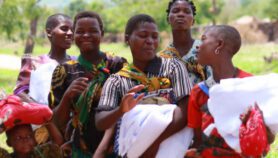Send to a friend
The details you provide on this page will not be used to send unsolicited email, and will not be sold to a 3rd party. See privacy policy.
Below is a round up of news from or about Sub-Saharan Africa for the period 13–25 March.
Scientists uncover clues to cause of Buruli’s ulcer
Researchers, including Anthony Ablordey from the University of Ghana, have for the first time isolated the bacteria causing Buruli’s ulcer — whose incidence is rising in tropical Africa — from the environment. The researchers, writing in PLoS Neglected Tropical Diseases, say this supports the idea that the disease is transmitted from an aquatic areas rather than person to person. More>>
Funding boost for cross-border conservation project
The Okavango–Zambezi Transfrontier Conservation project — which follows the Zambezi River and stretches across Angola, Botswana, Namibia, Zambia and Zimbabwe — has received a grant of €8 million from a German nongovernmental organisation. Part of the funds will be used for research in areas covered by the project. However, Angola has warned that civil war landmines may impede the project. More>>
Eflornithine ‘safe as first-line sleeping sickness treatment’
The drug eflornithine — previously used only as an alternative treatment for sleeping sickness due to its labour-intensive administration — is safe and effective as a first-line treatment for the disease. Researchers tracked over 1,000 adults and children at a centre in Ibba, Southern Sudan — the first use of eflornithine on a large scale. More>>
Cheaper rabies diagnosis ‘possible for low-income settings’
Accurate rabies diagnosis can be done ten times cheaper, according to researchers from the Farcha Veterinary and Livestock Research Laboratory and the Support International Health Centre in N’Djamena, Chad. The scientists evaluated a method using light microscopy, cheaper than the standard tests, and say this could provide better rabies control across Africa. More>>
Egypt goes forward, South Africa goes backward in child health
While Egypt and other countries with similar economies are on course to meet the UN Millennium Development Goal for child survival — halving the number of deaths for under-fives since 1990 — South Africa is failing. According to a report by the Child Healthcare Problem Identification Programme, denial of HIV/AIDS is one of the reasons South Africa is not progressing. More>>
Ethiopian geologists in gold swindle
Four chemists and geologists from the Ethiopian Geological Survey have been arrested in connection with a fake gold scandal. Gold bars from the National Bank of Ethiopia were found to be gilded metal in a random police check several weeks ago, costing the state around US$17 million. More>>
Cell-culture system boosts sorghum research
South African scientists have created a system to culture sorghum cells in suspension that they say will boost global sorghum proteomics studies. The researchers intend to use the method to better understand sorghum’s tolerance to drought. More>> ![]() [162kB]
[162kB]
Salmonella antibodies found in Malawi children
Malawian researchers have identified an antibody that protects children against bacterial infections of the blood caused by Salmonella. A study of 352 children at Blantyre’s Queen Elizabeth hospital found that children up to two years old develop the antibodies that kill the bacteria. The researchers say this could lead to a possible Salmonella vaccine. More>>
‘Gene may weaken HIV’, say researchers
A South African study suggests that some people carry an immune system gene that may damage HIV, hindering its reproduction. According to research published in PLoS Pathogens, the weaker virus may stay weak even when transmitted to people without the protective gene. More>>
Rich biodiversity found in Angolan river
Angola’s first biodiversity tally of the Kwanza River has so far found 50 fish species. Researchers from the National Fishing Research Institute and the South African Institute for Aquatic Biodiversity say genetic testing may reveal new species. More>>
Zambia study confirms breast is best for HIV mothers
Mary Glenn Fowler of the Makerere University–Johns Hopkins University Research Collaboration in Kampala, Uganda, presents further evidence that exclusively breastfeeding babies for six months prevents mother-to-child transmission of HIV. Fowler’s analysis looks at a Zambian study and research in South Africa and Zimbabwe. More>>
Compiled by Christina Scott. Additional reporting by Carol Campbell and Sharon Davis.
If you would like to suggest a story for this news in brief, please contact the Africa News Editor Christina Scott ([email protected]).













